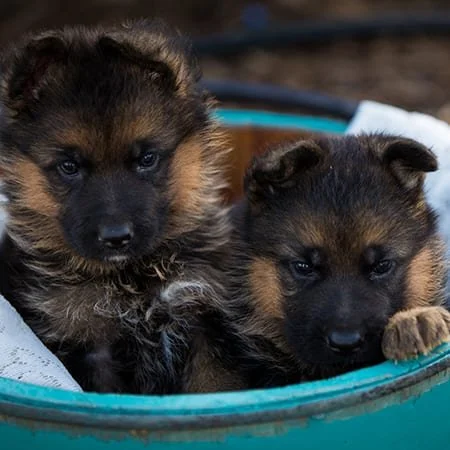What To Expect With Your New German Shepherd Puppy
By Traci Needles, Owner of Nadelhaus German Shepherds
Updated October 14, 2023
Bringing home a German Shepherd puppy is an exciting moment, but it can also be a source of uncertainty and anxiety. This guide is here to help you through those first crucial weeks and alleviate any concerns you may have. We'll cover essential topics like traveling home with your puppy, common issues new owners might have in the first week, establishing a feeding routine, and how to introduce your puppy to other household dogs.
Purchasing Your New German Shepherd Puppy from nadelhaus
When you purchase a German Shepherd puppy from Nadelhaus, we will give you the following items at the time of purchase:
A puppy health record, including vaccinations and de-worming
American Kennel Club (AKC) registration application papers
A feeding schedule
The breeder will review each of the items with you as well as the feeding schedule for your puppy. The breeder will also inform you of additional vaccinations you will need to schedule with your veterinarian as your puppy grows.
Traveling Home With Your New Puppy
On the day you pick up your new German Shepherd puppy from our facility, bring a small crate for the puppy to travel home in. We sell Puppy Packs at our facility (which include a dog crate) and can have one ready for you if you wish to purchase one. Otherwise, if you plan to hold your puppy in your lap on your drive home, bring a few small towels to place on your lap for the puppy.
Puppies tend to get car sick when they’re little, so bring paper towels for clean up. Don’t feed or offer water to your puppy on the way home, as this can make your puppy more nauseous.
We highly recommend that you DO NOT stop at rest stops, dog parks, or parks to let your puppy go potty. Your puppy will not have received all of its parvovirus shots yet, so exposing your puppy to areas where other dogs have been increases the risk of your puppy contracting parvo. Instead we recommend that you find places that have concrete or hard surfaces like a paved parking lot.
In the summertime, be conscious of the surface your puppy is walking on. Keep its paws off dark asphalt as this can burn your puppy’s paws on a hot summer day.
At Home Care For Your New Puppy
The first 24 to 36 hours in your new home is an acclimation period for your puppy to get settled in your home. The puppy’s activity level will be minimal to what it will be in the future, so don’t be surprised if your puppy’s energy level is lower during this time.
It is common for your German Shepherd puppy to have diarrhea or loose stool the first week it is in your new home. It is acclimating to a new world and a different schedule. Be very mindful about what kind of dog treats and toys you supply the puppy to chew on. These are all edible things that can cause loose stool and diarrhea. These are also additional calories that puppies will eat before they eat a meal. During their acclimation to your new homes, we recommend you keep treats and cookies to a minimum.
Don’t give your puppy bully sticks, rawhide or bones. These are too rich and too hard on their systems.
Wait at least 24 hours before giving your puppy a bath.
You are more than welcome to keep in touch with us during this time and ask questions via email or text. If you have any concerns please don’t hesitate to reach out to us.
THE TOP 3 ISSUES GERMAN SHEPHERD PUPPIES EXPERIENCE THE FIRST WEEK IN THEIR NEW HOME
How much to feed your 8 week old puppy
Feeding Your German Shepherd Puppy
We recommend that you soak your puppy’s kibble at least 1-2 hours prior to feeding it. (The breeder will review the amount of food and schedule with you when you pick up your puppy.) Soaking your puppy’s kibble will allow it to expand in the bowl and not in the puppy’s stomach which helps prevent gastric torsion (also known as bloat).
If your puppy has a weak appetite during the acclimation period you can add boiled boneless chicken and cooked white rice to its meals. Or you can add canned food to its meal to entice its appetite.
Discard any uneaten food after each meal.
Ensure your puppy has access to fresh, clean water during the day. If you are house breaking your puppy, remove access to water at least 4 hours prior to bed time.
THE IMPORTANCE OF SOAKING YOUR PUPPY’S KIBBLE
How to soak your dog’s kibble with water
introducing the nadelhaus learning center.
Join and learn directly from Nadelhaus founder Traci Needles, who has over 25 years of experience breeding and training German Shepherds.
Over 60 videos on the following topics covering German Shepherd puppies, housebreaking, crate training, obedience, feeding, grooming, wellness, and much more. New videos to be added every month.
WHY YOUNG PUPPIES GET DIARRHEA
Welcoming a new puppy into your home is an exciting time, but it can sometimes come with unexpected challenges. Diarrhea in very young puppies during their first 1-2 weeks in their new environment is not uncommon. Here's why:
Stress and Adaptation: The transition from their birthplace to a new home is a significant change for a young puppy. The stress of leaving their mother and littermates, coupled with adapting to a new diet and environment, can lead to gastrointestinal upset.
Dietary Changes: Puppies might experience a sudden switch in their diet when they move to their new home. This shift in nutrition, even if well-intentioned, can disrupt their delicate digestive systems and result in diarrhea.
Microbial Adjustment: The puppy's gut is in the process of developing a healthy balance of beneficial bacteria. Stress and changes in diet can temporarily affect this delicate balance, leading to digestive disturbances like diarrhea. This adjustment period is natural as the puppy's gut adapts to new microorganisms in their surroundings.
While occasional mild diarrhea can be expected, it's important to monitor your puppy's condition. Don’t hesitate to call or email us with any questions or concerns you have about your new puppy.
Why young puppies get diarrhea and how to treat it
Introducing Your Puppy To Other Pets
Gradual Introduction: Begin with neutral territory, not in the home of the adult dog, where both dogs can meet on leashes. Increase the time and frequency of their interactions slowly and under supervision.
Supervised Interaction: After bringing the puppy home, closely supervise their interactions. Start with separate spaces and controlled play sessions, intervening if tensions arise. Ensure each dog has a safe space to retreat to.
Patience and Adaptation: Understand that dogs have unique personalities. Be patient as they adjust to each other. Gradually extend their time together while monitoring their behavior and providing guidance as needed.
Introducing a puppy to an adult dog
watch even more videos on how to care for your german shepherd puppy with a learning center subscription
ABOUT THE AUTHOR
Traci Needles is the founder and owner of Nadelhaus German Shepherds™. Traci has been breeding German Shepherds since 1996. With nearly 30 years of experience with German Shepherds, she has extensive knowledge about this incredible working dog breed. Her mission is to breed German Shepherd dogs that have the ability to obtain Schutzhund titles and the highest possible conformation ratings. The German Shepherds she breeds are from 100% German bloodlines and Nadelhaus is a member of the GSDCA-WDA and SV of Germany.





